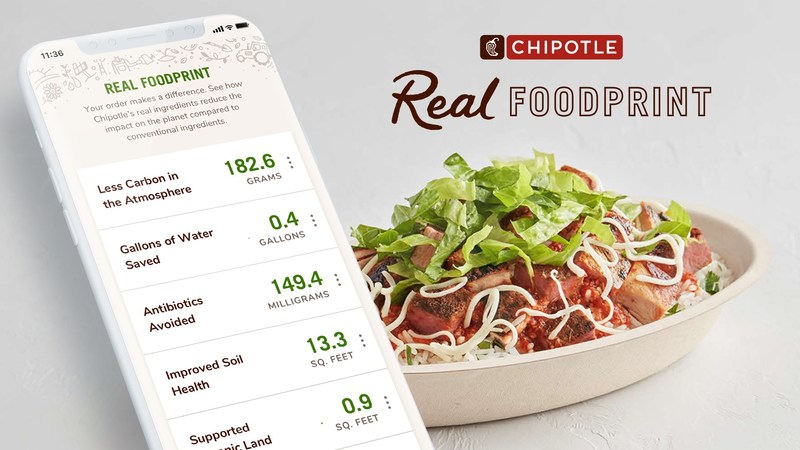Tracker compares Chipotle's ingredients and sourcing standards to industry average.

Chipotle Mexican Grill recently debuted Real Foodprint, a sustainability impact tracker in its app that compares average values for each of Chipotle's 53 real ingredients to their conventional counterparts against five key metrics
Less carbon in the atmosphere (measured in grams);
Gallons of water saved;
Improved soil health (measured in square feet);
Organic land supported (measured in square feet), and
Antibiotics avoided (measured in milligrams).
Chipotle said it is the first brand to provide detailed impact data about its ingredients for guests, holding the brand accountable for cultivating a better world.
The metrics for Real Foodprint are provided by HowGood, a mission-driven, independent research company with the world's largest sustainability database for products and ingredients. HowGood aggregates information from Chipotle's suppliers and more than 450 unique data sources -- including peer-reviewed scientific literature, industry findings and research from government and non-government organizations -- to evaluate the average impact of Chipotle's 53 real ingredients on the environment and animal welfare. Chipotle is the first restaurant brand to partner with HowGood.
Determining impact
To develop Real Foodprint, HowGood evaluated Chipotle's sourcing standards for all 53 ingredients to demonstrate the impact each Chipotle digital order is helping to have on the planet. The positive change in impact across the five key metrics is the difference between average data for each ingredient based on Chipotle's sourcing standards and conventional, industry average standards.
HowGood also aggregated data on the percentage of each ingredient used in each Chipotle menu item in order to help tailor each guest's Real Foodprint tracker. HowGood's thorough assessment of Chipotle's ingredients ensures that the brand can adjust its supply chain over time and continue to minimize the impact of each ingredient, the company said.
"Having worked with top global brands across the industry, we are particularly excited about Chipotle's approach to providing a truly comprehensive view of ingredient impact," HowGood chief executive officer Alexander Gillett said. "We're optimistic that their trailblazing could set a new tone for radical transparency and excited to have partnered with them to provide the level of granular, exhaustive data they are committed to using."
Defining conventional sourcing
To establish the industry average, HowGood used data from authoritative sources like the U.S. Department of Agriculture, the World Health Organization and the U.S. Food & Drug Administration to determine a baseline for conventional production of food.
"For more than 25 years, Chipotle has been dedicated to responsibly sourcing every single one of our ingredients and creating industry leading practices around animal welfare and sustainability," chief marketing officer Chris Brandt said. "Now, with Real Foodprint, our guests can see how this commitment is better for the planet in each individual order."
Guest experience
At the order confirmation screen on the Chipotle app and Chipotle.com, guests will receive data on five key metrics computed based on averages for the ingredients included in their order. The tracker compares Chipotle's ingredients and sourcing standards to an industry average, and the metrics provide a snapshot of computed environmental savings across categories. Fans can use the simulator on the Real Foodprint site to share their order's tracker results with their followers using the latest technology from Twitter.
"Beyond asking people to make the right choice for the climate based on a carbon label, we are demonstrating the impact of our sourcing practices through data computed based on the ingredients in our guests' orders," said Caitlin Leibert, head of sustainability at Chipotle. "While our guests can make good choices for the planet by simply eating at Chipotle, the radical transparency provided by Real Foodprint also holds us accountable to improve our practices and source more sustainably over time. It is the combination of transparency for our guests and Chipotle's commitment to higher standards that make Real Foodprint so impactful."
About the Author(s)
You May Also Like




.png?width=300&auto=webp&quality=80&disable=upscale)
